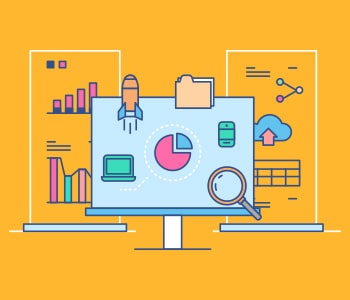Paid Marketing
- Home
- Service
- Paid Marketing
The power of paid marketing : A comprehensive overview
In the realm of digital marketing, paid marketing stands out as a powerful tool that can dramatically increase brand reach, generate targeted traffic, and generate higher leads Unlike organic marketing, relying on unpaid strategies such as SEO and content marketing Explores the essentials of paid marketing for successful campaigns, as well as profitability, diversity and best practices.

Search Engine Advertising
Google Ads: The most popular form of PPC advertising, where businesses bid on keywords related to their products or services. Ads appear at the top of search engine results pages (SERPs), increasing visibility and driving targeted traffic.

Social Media Advertising
Facebook Ads: Offers extensive targeting options based on user behavior, interests, and demographics. It's ideal for both brand awareness and direct response campaigns. Instagram Ads: Leverages Facebook's targeting capabilities, focusing on visually engaging ads suitable for a younger audience. LinkedIn Ads: Effective for B2B marketing, allowing advertisers to target professionals based on job titles, industries, and skills. Twitter Ads: Enables targeting based on interests, demographics, and even specific keywords in users' tweets.


Video Advertising:
Platforms like YouTube offer video ad placements that can engage users more interactively. Video ads are effective for storytelling and demonstrating products in action.

Display Advertising:
Involves placing banner ads on websites across the internet. Display ads are great for building brand awareness and retargeting users who have previously visited your site.
Understanding Paid Marketing
Paid marketing, also known as pay-per-click (PPC) advertising, is a strategy where advertisers pay a fee each time their ad is clicked. It’s an effective way to buy visits to your site, rather than earning them organically. The most common platforms for paid marketing include Google Ads, Facebook Ads, Instagram Ads, LinkedIn Ads, and Twitter Ads, each offering unique advantages and targeting capabilities.
Benefits of Paid Markating:
Immediate Results:
- One of the primary advantages of paid marketing is the ability to see immediate results. Unlike SEO, which can take months to show significant outcomes, PPC campaigns can drive traffic and conversions almost instantly once they are live.
Targeted Advertising:
- Paid marketing allows for highly specific audience targeting. Advertisers can target users based on demographics, location, interests, behavior, and even past interactions with the brand. This precision ensures that ads are shown to the most relevant audience, maximizing the chances of conversion.
Scalability:
- Paid campaigns are highly scalable. Businesses can start with a small budget and increase spending as they see positive returns on investment (ROI). This flexibility makes paid marketing suitable for companies of all sizes.
Measurable Results:
- PPC platforms provide detailed analytics and reporting, allowing advertisers to measure the effectiveness of their campaigns accurately. Metrics such as click-through rates (CTR), conversion rates, and cost per acquisition (CPA) help in refining and optimizing strategies for better performance.

Best Practices for Paid Marketing
Keyword Research:
- Conduct thorough keyword research to identify relevant and high-intent keywords. This helps in reaching users who are actively searching for your products or services.
Ad Quality:
- Craft compelling and relevant ad copy. High-quality ads not only attract clicks but also improve your ad’s Quality Score on platforms like Google Ads, reducing costs and improving ad placement.
Landing Page Optimization:
- Ensure that your landing pages are optimized for conversions. They should be relevant to the ad, load quickly, and provide a clear call to action.
A/B Testing:
- Continuously test different ad variations to determine what works best. A/B testing helps in identifying the most effective headlines, images, and calls to action.
Monitor and Adjust:
- Regularly monitor campaign performance and make necessary adjustments. Use analytics to identify trends and areas for improvement, ensuring that your campaigns remain cost-effective and impactful.
Love From Clients
Request a Call Back
Connect with one of our Specialists for a free consultation, get support from our customer success team, today!
Frequently Asked Questions

Paid marketing, also known as pay-per-click (PPC) advertising, involves paying for ad placements on search engines, social media platforms, or other websites. Advertisers pay a fee each time their ad is clicked, driving traffic and conversions to their site.
Paid marketing provides immediate visibility, precise audience targeting, and measurable results. It helps in quickly driving relevant traffic to your site, increasing brand awareness, and achieving specific marketing goals like lead generation or sales.
Set a budget based on your campaign goals, cost-per-click (CPC) estimates, audience size, and historical performance data. Start with a modest budget, monitor performance, and adjust based on the return on investment (ROI) and other key metrics.
Measure success using key performance indicators (KPIs) like click-through rate (CTR), conversion rate, cost per conversion (CPC), and return on ad spend (ROAS). Regularly analyze these metrics to optimize your campaigns for better results.
Performance
Start working with an company that provide everything you need to anything is going very well but you don’t know.
80 %
899 of 1203Unique Visitor
75 %
899 of 1203Conversions
70 %
899 of 1203Bounce Rate
SUCCESS STORIES Our Case Study

Hosting website Rank
Marketing SEO

Traffic Management
Marketing SEO

Web Traffic Management
Marketing SEO

Cloaking & Doorway Pages
Marketing SEO

Hosting company rank
Marketing SEO

SEO Case Study
Marketing SEO
